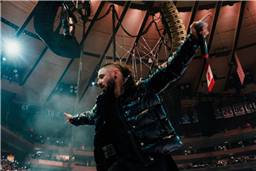
Ninety minutes into a set at Madison Square Garden, EDM mainstay Skrillex jumped onto the DJ booth, arms outstretched, head tilted back and bathed in cell phone lights, the screaming crowd and rattling bass. When the massive drop hit and the house lights dropped, his rebirth was complete.
The Feb. 18 show, a collaboration with fellow DJs Fred Again and Four Tet, was billed as a pop-up rave, akin to the secret sets the trio had been playing in the last few weeks in London clubs, Brooklyn’s Good Room and even a makeshift bus in the middle of Times Square. While the MSG show sold like a legacy artist — with tickets gone in minutes and fans begging for a miracle on message boards — the Skrillex seen trotting around on social media prior to the sets was decidedly a different figure than a dubstep titan.
Born Sonny Moore and cutting his teeth as the singer of screamo outfit From First to Last, Skrillex turned to electronic music in 2008 and quickly became one of the most successful artists in the dubstep genre, catching the wave of increased popularity with a brash sound. Yet massive gigs and paydays also made him a poster boy for the much maligned dance music community, as nonbelievers clowned on his name, style, asymmetrical haircut and influential trademark sound, which skeptics described as something akin to orgasming robots.
After dropping a handful of chart-topping collaborations with two divisive pop dudes — fellow producer Diplo and former teen idol Justin Bieber — Skrillex seemed to quiet down after 2015. While dropping loose singles here and there, much of his creative effort seemed to be on songwriting for stars like Ed Sheeran, Lady Gaga and Beyoncé.
But at the beginning of 2023, a new album cycle began. With his signature hairstyle cut (relatively) high and tight and the guidance of a new stylist, Skrillex seemed to be entering his grown and sexy phase. His music matured too, moving away from the industrial aesthestic that shaped his previous projects with a warmer bed of sounds that seemed to touch on more global rhythms. His new album, “Quest for Fire,” dropped the day before the show, and a follow-up, “Don’t Get Too Close,” dropped during it.
Fans were eager to see Skrillex 2.0. While his sound had changed, it was clear he had no intention of slowing down the party. Sharing the night with close collaborators Fred Again (a pop songwriter-turned-DJ rising star thanks to his “Actual Life” trilogy of albums) and Four Tet (an indie electronic music veteran who has been making albums and remixes for 25 years), the trio bounced all around the DJ booth for five hours, hyping up the crowd with a wild mix of music that bounded through all of their styles and careers.
A well-lit stadium didn’t stop fans dancing from minute one, as the first hour and a half found people crowding the floor and finding seats, stuffing the stadium to capacity. Once the overhead lights went down, a simplified strobe rig and thunderous speakers was all the trio needed visually, as they eschewed jumbotrons in order to mimic grimy warehouse sets, just on a massive scale.
The crowd ate up every song transition and drop, cheering as loudly for winky remixes of Destiny’s Child and Taylor Swift as they would for some of Skrillex’s biggest hits, such as a remixed version of his own take on Benny Benassi’s “Cinema” or a hyped moment featuring early “Fire” standout “Ratata.”
Although Skrillex was arguably the biggest performer in terms of social media reach and Spotify listeners, it’s clear the trio has come together like an EDM Voltron, spending much of the set laughing, singing along, hugging, gassing each other up and getting the crowd to scream their names. Their tastes blended into one overarching sound as they passed off control of the boards to each other, echoing the community spirit that so often overtakes the crowds at dance shows.
As the set wrapped around midnight, chatter focused on topics like “I didn’t know Four Tet’s stuff coming in, but I need to check him out,” or, “I wasn’t a big Skrillex fan, but working with Fred has really opened his stuff up for me.” In the wake of a pandemic which silenced live dance music for months, this marathon rave united New York City fans and brought a genre to its feet once again.
Read More About:
Source: Read Full Article